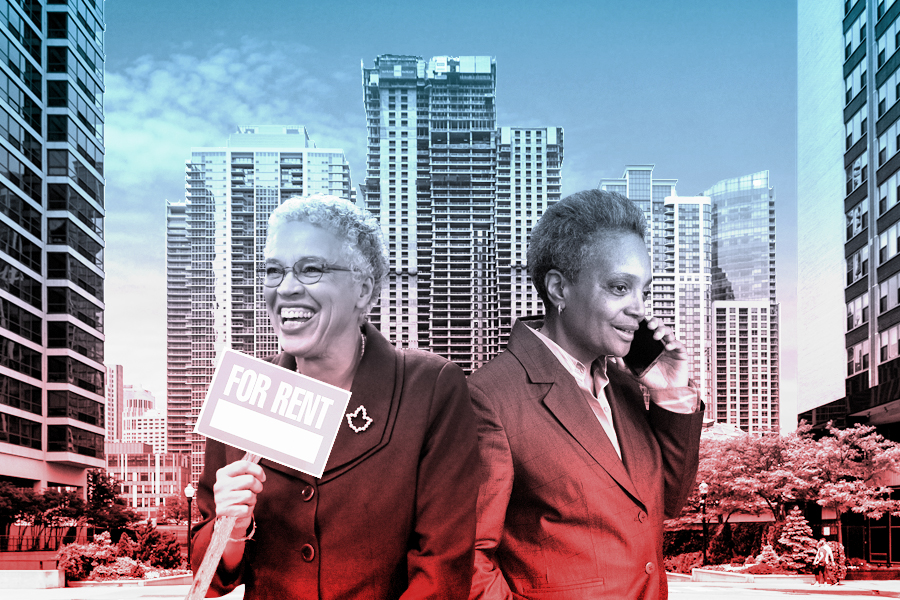Toni Preckwinkle has come out strongly in favor of repealing Illinois's Rent Control Pre-Emption Act of 1997. The law provides that "[a] unit of local government … shall not enact, maintain, or enforce an ordinance or resolution that would have the effect of controlling the amount of rent charged for leasing private residential or commercial property."
In other words: no rent ceiling.
During the primary, Preckwinkle was one of two candidates to answer "yes" on a questionnaire about lifting the ban by the Chicago Association of Realtors, which opposes rent control. (The other was LaShawn Ford.) Preckwinkle recently reiterated her position in a press release:
"I support lifting the city's ban on rent control. When considering city legislation to establish a rent control, I believe this power should be given back to local municipalities so they can decide how rent control would best work for them. This decision should not be implemented solely from the power of the Mayor's office, but should be an engaging process between activists, elected officials and all stakeholders. I have confidence that drawing input from different groups of stakeholders will create an optimal solution to the problem of Chicago's rising rents that are pushing families out of their homes and communities."
Preckwinkle said just as much again during Thursday’s NBC5 debate, telling moderator Carol Marin that the city needs rent control.
Lori Lightfoot, on the other hand, didn't respond to the rent control question on the Association of Realtors survey.
Later, during the same group's mayoral forum at Manny's Deli in South Loop, she said this: "for renters, this city is not working … [but] I don't think rent control is the issue we need to be focused on right now. We have a huge affordable-housing crisis in the city. In two-thirds of the city [in the past several years], not a single affordable unit has been built."
Last week, I asked Lightfoot's campaign whether she'd taken a stance on repealing the ban. Here's how a staffer responded, by email:
Lori is focused on building more affordable housing units. Here's what Lori said in a recent questionnaire: "We are in an affordable housing crisis. Conservative estimates are that the city is short 120,000 affordable units. I share the great concern that renters are being priced out of the city by escalating rents. I believe that it is imperative that we address this crisis by aggressively ensuring that more affordable housing units are built all over the city, as discussed in my affordable housing plan.
There aren't a lot of policy differences between Lightfoot and Preckwinkle. Both favor legalizing marijuana. Both want a progressive income tax. Both oppose the new police training academy that Rahm Emanuel wants to build on the West Side.
So if Toni is pushing for rent control, and Lori doesn't think it's important, that could be significant — especially to progressive activists who've adopted the issue as a solution to Chicago's housing affordability crisis.
A week ago, I was walking down Michigan Avenue when I passed a group of marchers from the Lift the Ban Coalition, whose goal is to repeal rent control. Holding signs reading "Lift the Ban" and "Rent Control Now," they were headed for a demonstration outside the Chicago Association of Realtors offices. I called them up afterward.
“I've already heard from people who care about affordable housing,” said Jawanza Malone, a member of the Lift the Ban Coalition and executive director of the Kenwood-Oakland Community Organization. “While they feel that Toni has a bad record on housing issues, the fact that she supports rent control is making them look at her.”
In the February election, the Coalition placed nonbinding pro-rent control referenda on the ballot in select precincts of the 1st, 26th, 45th and 50th wards. In every case, voters approved them, usually with more than two-thirds of the vote.
Last November, ward-wide rent control referenda were approved in the 35th, 46th, and 49th wards. All those wards are on the North and Northwest sides, where concerns about gentrification have influenced neighborhood politics for decades.
The Rent Control Pre-Emption Act was passed by a much more conservative state government than the one sitting today. Republicans controlled the Senate, and Democrats held a bare majority in the House of Representatives. The act was signed by Republican Gov. Jim Edgar.
It was also passed during a prosperous decade, when housing affordability was a less urgent problem. Since 1997, we've been through the foreclosure crisis and the Great Recession. According to the Coalition, between 2000 and 2009, income in Chicago fell 8.1 percent, while rent burdened tenants — those who pay more than a third of their incomes in rent — increased from 44.5 percent to 54.1 percent of all renters.
Two rent control bills have been introduced in Springfield this session. One, sponsored by Rep. Will Guzzardi, states simply that "the Rent Control Preemption Act is repealed." Another, sponsored by Rep. Mary Flowers, would create six regional rent control boards with the power to punish landlords "who charge rent in excess of amounts allowed by the Act."
“Having a big city mayor come out in support of these bills would go a long way,” Malone says.
Meanwhile, the Tribune last week editorialized against rent control, saying it would “make housing scarcer, depress property values, and result in units that are in poorer condition.”
If the legislature repeals the ban, the mayor could then ask the City Council to pass a rent control ordinance — something Preckwinkle sounds inclined to do, and something voters have indicated they want from their next mayor. In a race with two candidates whose policies largely mesh, rent control is an issue they differ on. Let’s hope it gets more than a passing mention in the next debate.



